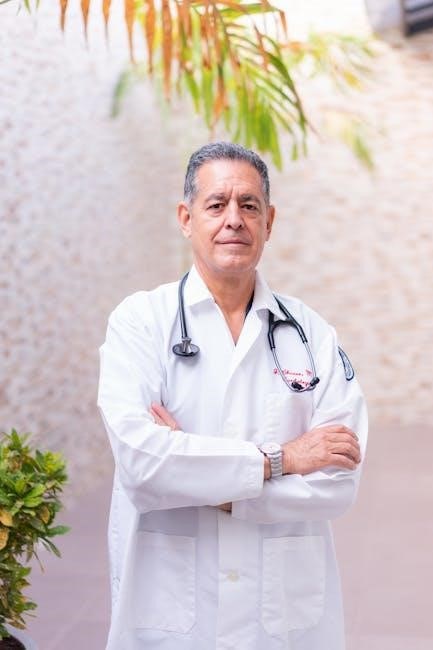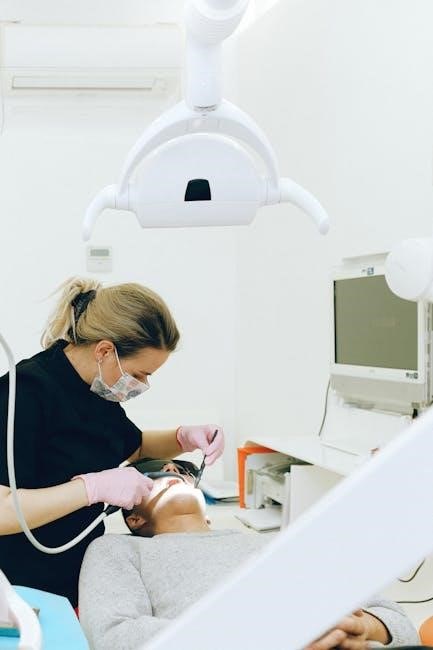This resource simplifies learning medical terminology for healthcare professionals and students, focusing on body systems, word parts, and interactive tools for effective understanding and retention.
Overview of Medical Terminology
Medical terminology is the standardized language used in healthcare to describe body structures, processes, and conditions. It combines Greek, Latin, and modern English roots, prefixes, and suffixes to create precise terms. Organized by body systems, it enables clear communication among professionals. This system is essential for documenting patient care, understanding diagnoses, and ensuring accurate treatments. The structured approach simplifies learning, making it accessible for students and professionals alike. Mastery of this language enhances clinical decision-making and effective patient care across all healthcare disciplines.
Importance of Medical Terminology in Healthcare
Medical terminology is the cornerstone of effective healthcare communication, enabling precise documentation and clear understanding among professionals. It ensures accurate diagnoses, treatments, and patient care. By standardizing language, it reduces errors and enhances collaboration across disciplines. Proficiency in medical terminology is vital for interpreting medical literature, understanding research, and contributing to evidence-based practice. It empowers healthcare providers to deliver high-quality care, making it an essential skill for all professionals and students in the health professions.
Structure of the Medical Terminology for Health Professions PDF
The PDF is organized into 15 chapters, each focusing on specific body systems and medical terms. It includes word part reviews, comprehensive coverage of terminology, and interactive supplements like StudyWARE. Designed for healthcare professionals and students, the resource provides a clear framework for mastering medical language. Chapters are structured to build understanding progressively, with tools for pronunciation and application. This format ensures learners can systematically grasp complex terms, making it an invaluable resource for both education and professional practice in the health professions.

Key Features of the Medical Terminology for Health Professions PDF
Comprehensive coverage of medical terms, organization by body systems, inclusion of word parts, pronunciation guides, and interactive learning tools make this PDF an essential resource for healthcare professionals and students.
Comprehensive Coverage of Medical Terms
The PDF provides a detailed and systematic exploration of medical terminology, covering all body systems and healthcare disciplines. It includes terms related to anatomy, physiology, diseases, treatments, and pharmacology, ensuring a broad understanding. Each term is clearly defined, with context provided for practical application. The comprehensive approach ensures that learners gain a thorough knowledge base, essential for effective communication in healthcare settings. This extensive coverage makes it an invaluable resource for both students and professionals in the health professions.
Organization by Body Systems
The PDF is organized by body systems, allowing learners to master terminology progressively. Each chapter focuses on a specific system, such as skeletal, muscular, or digestive, ensuring a logical flow. Terms are broken down into prefixes, suffixes, and roots, making complex words easier to understand. This systemic approach helps learners correlate terms with their anatomical and physiological contexts, enhancing retention and practical application in healthcare settings. The structure supports focused study and ensures a comprehensive understanding of medical terminology as it relates to each body system.
Inclusion of Word Parts and Pronunciation Guides
The guide includes detailed word parts—prefixes, suffixes, and root words—to help learners decode and construct medical terms. Pronunciation guides are provided for each term, enhancing understanding and correct usage. This approach ensures that users can confidently articulate medical terminology in clinical settings. By breaking down complex terms into manageable components, the resource facilitates effective learning and application, making it an invaluable tool for healthcare professionals and students seeking to master medical language efficiently and accurately.
Interactive Learning Tools and Exercises
The guide incorporates interactive learning tools such as StudyWARE, offering exercises, quizzes, and audio pronunciation guides. These tools enhance engagement and retention, allowing users to practice and apply medical terminology effectively. Interactive exercises provide immediate feedback, helping learners identify and correct mistakes. Audio guides ensure proper pronunciation, while digital supplements offer additional practice opportunities. These resources make learning dynamic and accessible, enabling healthcare professionals and students to master medical terminology with confidence and precision in real-world applications.
Target Audience for the Medical Terminology Guide
This guide is designed for healthcare professionals, students in health professions, nursing, medicine, and physician assistants, as well as those in healthcare administration and pre-professional fields.
Healthcare Professionals and Students
This guide is specifically tailored for healthcare professionals and students, providing a comprehensive understanding of medical terminology. It is designed to help learners master complex terms through organized chapters, word parts, and pronunciation guides. The resource is ideal for students in nursing, medicine, and physician assistant programs, as well as practicing professionals seeking to enhance their knowledge. Its interactive tools and exercises make it an effective tool for both classroom and self-paced learning, ensuring a strong foundation in medical language for all healthcare disciplines.
Pre-Professional and Allied Health Sciences Students
This guide is an essential resource for pre-professional and allied health sciences students, offering a structured approach to mastering medical terminology. It provides clear breakdowns of terms, pronunciation guides, and practical exercises tailored to their learning needs. The text is organized by body systems, making it easier to understand and retain complex terminology. This resource is particularly valuable for students preparing for careers in nursing, physical therapy, and other allied health fields, ensuring they gain a solid foundation in medical language early in their education.
Healthcare Administrators and Support Staff
This guide is a valuable tool for healthcare administrators and support staff, enabling them to communicate effectively with healthcare providers and understand medical documentation. It provides a clear understanding of medical terms, aiding in accurate record-keeping and efficient workflow management. The resource is structured to meet the needs of both experienced professionals and new support staff, offering a comprehensive yet accessible approach to mastering medical terminology in administrative and operational roles within healthcare settings.
Learning Resources and Support Tools
The guide offers StudyWARE, interactive exercises, and audio pronunciation guides, providing comprehensive digital support for mastering medical terminology effectively and engagingly.
StudyWARE and Digital Supplements
StudyWARE and digital supplements enhance learning by providing interactive activities, self-assessment exercises, and audio pronunciation guides. These tools reinforce understanding and retention of medical terminology, offering a dynamic approach to mastering complex terms. The digital resources complement the PDF guide, ensuring comprehensive coverage of body systems, word parts, and clinical applications. Designed for healthcare professionals and students, these supplements make learning engaging and accessible, promoting confident communication in medical settings.
Interactive Exercises and Quizzes
Interactive exercises and quizzes are essential tools for reinforcing medical terminology knowledge. These activities, often included in digital supplements, allow learners to test their understanding through self-assessment. Multiple-choice questions, drag-and-drop exercises, and matching games help healthcare professionals and students apply their knowledge in practical scenarios. Audio pronunciation guides further enhance learning by improving diction and comprehension. Regular practice through these exercises ensures mastery of complex terms, preparing users for real-world applications in patient care and documentation.
Audio Pronunciation Guides
Audio pronunciation guides are a valuable feature in the Medical Terminology for Health Professions PDF, aiding learners in mastering the correct diction of medical terms. These guides provide clear, audible examples of how terms should be pronounced, enhancing both learning and retention. By listening to native pronunciation, healthcare professionals and students can improve their communication skills, ensuring accuracy in patient care and documentation. This tool is particularly beneficial for visual and auditory learners, making complex terminology more accessible and easier to understand in real-world applications.

The Importance of Medical Terminology in Healthcare Communication
Medical terminology ensures clear communication among healthcare providers, enabling accurate documentation and effective patient care. It standardizes language, reducing errors and enhancing understanding across all healthcare settings.
Effective Communication Among Healthcare Providers
Medical terminology serves as the foundation for clear and precise communication among healthcare professionals. Standardized language ensures that all providers, from nurses to specialists, share a common understanding of terms, reducing misunderstandings and errors. This uniformity enables effective collaboration, ensuring accurate diagnoses, treatments, and patient care. By using standardized terminology, healthcare teams can communicate efficiently, enhancing overall patient safety and outcomes. The Medical Terminology for Health Professions PDF guide provides essential tools to master this language, fostering consistent communication across all healthcare settings.
Accurate Documentation and Record-Keeping
Accurate documentation is critical in healthcare, and medical terminology ensures precision in recording patient information. Standardized terms prevent errors and misinterpretations, enabling clear and consistent record-keeping. This accuracy is vital for legal compliance, insurance claims, and continuity of care. The Medical Terminology for Health Professions PDF guide emphasizes the importance of correct terminology in documentation, providing tools to master terms and ensure reliable patient records. Proper documentation also supports effective communication and reduces risks associated with unclear or ambiguous information.
Improved Patient Care Through Clear Understanding
Clear understanding of medical terminology enhances patient care by ensuring precise communication and accurate interpretation of conditions. This leads to more accurate diagnoses, effective treatments, and better health outcomes. Misunderstandings are minimized, reducing errors in care. The Medical Terminology for Health Professions PDF guide provides the tools needed to master terminology, enabling healthcare professionals to deliver high-quality, patient-centered care. Clear communication fosters trust and ensures that patients receive appropriate interventions, improving overall well-being and satisfaction.

Medical Terminology and Anatomy and Physiology
Medical terminology is deeply intertwined with anatomy and physiology, providing precise language to describe body structures, functions, and processes. This integration enhances communication and documentation accuracy in healthcare.
Relationship Between Terminology and Body Systems
Medical terminology is closely linked to body systems, allowing healthcare professionals to describe conditions, diseases, and treatments accurately. Each body system has specific terms, such as cardiovascular for heart-related conditions or neurological for brain and nerve disorders. Understanding these terms is essential for effective communication and diagnosis. The PDF organizes content by body systems, making it easier to learn and apply terminology in clinical settings. This structured approach helps in mastering prefixes, suffixes, and root words related to each system, enhancing retention and practical application in diagnostics and treatments.
Understanding Prefixes, Suffixes, and Root Words
Mastering prefixes, suffixes, and root words is fundamental to decoding medical terminology. Prefixes indicate location or number, while suffixes denote conditions or procedures. Root words represent body parts or functions. For example, “cardio-” refers to the heart, and “-itis” signifies inflammation. The PDF provides detailed breakdowns and practice exercises to help learners recognize and combine these elements effectively. This foundation enhances understanding of complex terms and improves communication in healthcare settings, ensuring accurate documentation and patient care.
Combining Forms and Medical Terminology
Combining forms are essential in forming medical terms by linking roots with prefixes and suffixes. For instance, “arthro-” (joint) + “-scopy” (examination) creates “arthroscopy.” This systematic approach aids in understanding complex terms, enhancing communication among healthcare professionals. The PDF guides learners through exercises that practice combining forms, reinforcing retention and practical application in clinical settings.

Medical Terminology in Clinical Practice
Medical terminology is vital in clinical settings for accurate communication and effective patient care, enabling healthcare professionals to understand and apply terms in real-world scenarios efficiently.
Application in Diagnostics and Treatments
Medical terminology is essential in diagnostics and treatments, enabling healthcare professionals to identify conditions, select appropriate diagnostic tests, and guide therapeutic interventions accurately. It facilitates precise communication, ensuring clarity in clinical decision-making and care planning. By understanding terms related to symptoms, procedures, and medications, professionals can interpret test results, develop treatment plans, and monitor patient progress effectively. This accurate use of terminology directly impacts patient outcomes, making it a cornerstone of effective clinical practice in modern healthcare settings.
Use in Medical Charting and Reporting
Medical terminology is vital for accurate and clear documentation in patient records. It ensures standardized communication, preventing errors and enhancing care coordination. By using precise terms, healthcare professionals create detailed, consistent charts that reflect diagnoses, treatments, and patient responses. This clarity aids in legal compliance, insurance billing, and future reference. Effective charting also supports continuity of care, enabling seamless communication among healthcare teams. The use of correct terminology in reports ensures that patient information is conveyed accurately, maintaining the integrity of medical records and improving overall patient management and outcomes.
Role in Specialized Fields Like Nursing and Medicine
Medical terminology plays a crucial role in specialized fields such as nursing and medicine, where precise communication is essential. It enables healthcare professionals to accurately document diagnoses, treatments, and patient responses. In nursing, it ensures clear care plans and effective patient monitoring. For physicians, it facilitates accurate diagnoses and treatment decisions. The standardized language provided in resources like the Medical Terminology for Health Professions PDF ensures consistency, reducing errors and improving patient outcomes in these critical fields.
Mastering Medical Terminology
Medical Terminology for Health Professions offers strategies and resources to simplify learning, such as word parts, body system organization, and interactive tools, ensuring effective retention and application.
Strategies for Learning and Retaining Terms
Effective strategies for mastering medical terminology include breaking terms into word parts, organizing by body systems, and using interactive exercises. Audio pronunciation guides enhance retention, while active recall and spaced repetition reinforce learning. Applying terms in clinical contexts and using flashcards also aid in long-term retention. These methods ensure healthcare professionals and students can confidently understand and apply medical terminology in their practice.
Common Mistakes to Avoid
Common mistakes include mispronouncing terms, misidentifying word parts, and neglecting to apply terms in clinical contexts. Overreliance on memorization without understanding root meanings can lead to errors. Ignoring pronunciation guides may result in communication issues. Failing to review regularly and skipping interactive exercises can hinder retention. To avoid these pitfalls, learners should focus on breaking down terms, practicing pronunciation, and applying knowledge in real-world scenarios. Consistent practice and review are essential for mastering medical terminology effectively.
Resources for Continuous Learning
Supplement your learning with StudyWARE, offering interactive exercises and quizzes. Utilize online platforms for additional practice and review. Join professional communities to network and share knowledge. Access digital supplements, including audio guides, to enhance understanding. Regularly review recommended textbooks and resources for in-depth study. Engage in continuous practice to reinforce retention and stay updated with industry developments. These tools provide a comprehensive approach to mastering medical terminology effectively.

Medical Terminology and Healthcare Research
Mastering medical terminology is essential for accessing and interpreting research literature, ensuring accurate understanding of clinical studies and contributing to evidence-based practice in healthcare.
Accessing and Utilizing Medical Literature
Medical terminology is crucial for accessing and interpreting research literature, enabling healthcare professionals to understand complex clinical studies. The PDF resource provides comprehensive coverage of medical terms, organized by body systems, aiding in identifying conditions, treatments, and anatomical structures. Word parts and pronunciation guides further enhance the ability to decode and apply terminology accurately. By mastering this skill, professionals can effectively navigate medical databases, contributing to evidence-based practice and advancing healthcare research with precision and clarity.
Understanding Research Terminology
Understanding research terminology is essential for interpreting medical studies and applying evidence-based practices. The PDF resource emphasizes breaking down complex terms into root words, prefixes, and suffixes, making it easier to comprehend research findings. Organized by body systems, it helps professionals and students identify conditions and treatments within specific anatomical contexts. Interactive tools and exercises further enhance the learning process, ensuring accurate interpretation of medical literature and contributing to informed decision-making in healthcare settings. This skill is vital for advancing research and improving patient care outcomes effectively.
Contribution to Evidence-Based Practice
Medical terminology is a cornerstone of evidence-based practice, enabling healthcare professionals to interpret and apply research findings accurately. The resource equips users with precise language skills, facilitating the translation of research into clinical applications. By understanding medical terms, professionals can critically analyze studies, identify best practices, and implement evidence-based interventions. This fosters a culture of informed decision-making, ultimately enhancing patient outcomes and advancing healthcare standards. The guide’s focus on clarity and comprehension ensures that research terminology is accessible, supporting continuous improvement in care delivery.
Mastery of medical terminology is essential for professional success, enabling clear communication and accurate care. This guide provides a comprehensive foundation, ensuring proficiency in healthcare terminology.
Final Thoughts on the Importance of Medical Terminology
Medical terminology is the cornerstone of clear communication in healthcare, ensuring accurate documentation, effective care, and precise problem-solving. Mastery of this language empowers professionals to adapt to new advancements and deliver high-quality patient care. For students and healthcare workers, resources like the Medical Terminology for Health Professions guide provide invaluable tools to navigate the complex world of medicine with confidence and precision, fostering lifelong learning and professional excellence.
Encouragement for Lifelong Learning
Embracing lifelong learning is essential for healthcare professionals to stay updated with evolving medical terminology and advancements. Resources like the Medical Terminology for Health Professions guide, along with StudyWARE and online platforms, offer interactive tools to enhance learning. By committing to continuous education, professionals can refine their skills, adapt to new terminology, and deliver optimal patient care. Encouraging a growth mindset fosters professional excellence and ensures clarity in communication, ultimately benefiting both practitioners and patients in the ever-evolving healthcare landscape.

References and Further Reading
Key resources include textbooks like Medical Terminology for Health Professions by Ann Ehrlich, online platforms, and professional communities for continuous learning and practice;
Recommended Textbooks and Resources
The primary textbook is Medical Terminology for Health Professions by Ann Ehrlich, available in its 7th and 8th editions. This comprehensive guide offers detailed coverage of medical terms, organized by body systems, and includes word parts, pronunciation guides, and interactive exercises. Supplements like StudyWARE provide additional learning tools, such as audio pronunciation guides and quizzes, enhancing understanding and retention. As an Open Educational Resource (OER), it is freely accessible, making it an invaluable asset for students and professionals in healthcare disciplines.
Online Platforms for Medical Terminology Practice
StudyWARE and other digital supplements provide interactive exercises and quizzes to reinforce learning. Online platforms like Quizlet and Khan Academy offer flashcards and practice tests for medical terminology. These tools cater to diverse learning styles, enabling students and professionals to master terms at their own pace. Accessible anytime, they are invaluable for reinforcing concepts and preparing for exams or real-world applications in healthcare settings.
Professional Organizations and Communities
Professional organizations like the American Medical Technologists (AMT) and the National Healthcareer Association (NHA) offer valuable resources and networking opportunities for healthcare professionals. These communities provide access to updated medical terminology guidelines, workshops, and certification programs. Additionally, online forums and groups dedicated to medical terminology allow professionals to share knowledge, discuss challenges, and stay informed about industry developments. Engaging with these organizations enhances learning and professional growth, ensuring accurate and effective use of medical terminology in healthcare settings.
